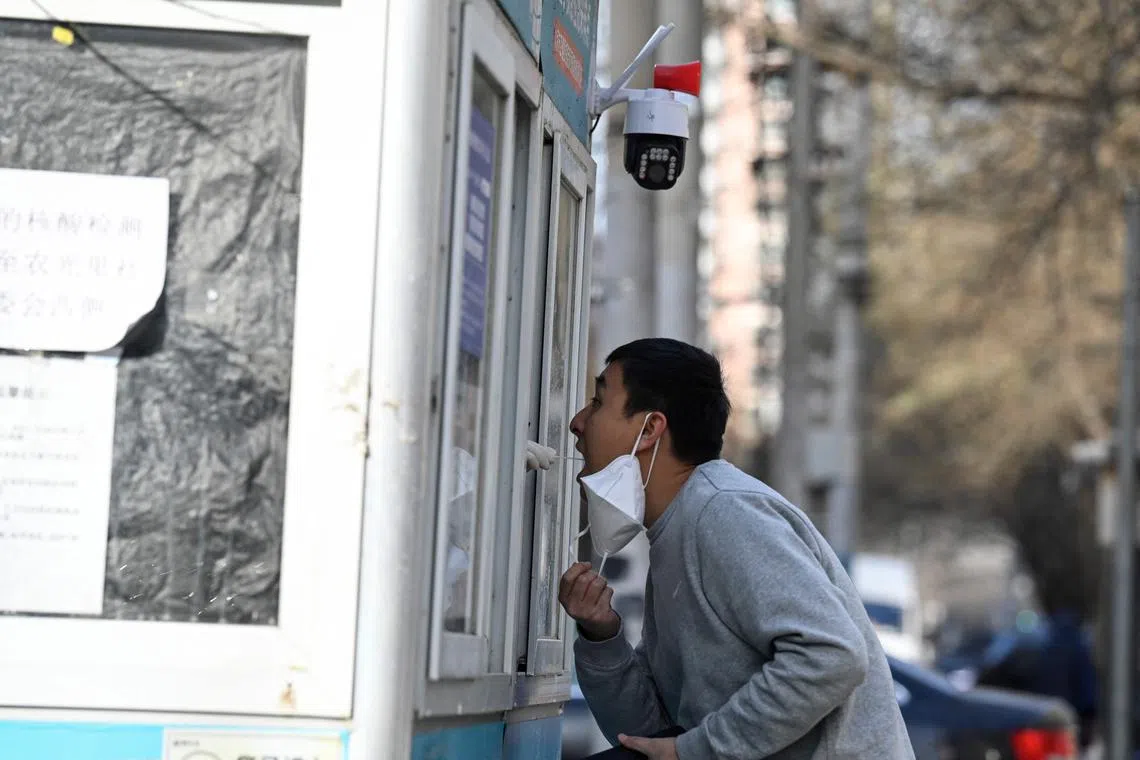China's cities battle first wave of Covid-19 surge as wider spread looms
Sign up now: Get insights on Asia's fast-moving developments

China is currently in the first of an expected three waves of Covid-19 cases this winter.
PHOTO: AFP
Follow topic:
BEIJING - Streets in major Chinese cities were eerily quiet on Sunday as people stayed home to protect themselves from a surge in Covid-19 cases that has hit urban centres from north to south.
China is currently in the first of an expected three waves of Covid-19 cases
Cases could multiply across the country if people follow typical travel patterns of returning to their home areas in a mass transit movement for the Chinese New Year holiday in January.
China is also yet to officially report any Covid-19 deaths since Dec 7, when it abruptly ended most restrictions
As part of the easing of the zero-Covid curbs, mass testing for the virus was ended, casting doubt on whether officially reported case numbers can capture the full scale of the outbreak. China reported 2,097 new symptomatic Covid-19 infections on Saturday.
In Beijing, the spread of the highly transmissible Omicron variant has already hit services from catering to parcel deliveries. Funeral homes and crematoriums across the city of 22 million are also struggling to keep up with demand.
Social media posts also showed empty subways in Xi’an city in the north-west, while Internet users complained of delays to deliveries.
In Chengdu, streets were deserted but food delivery times were improving, said a resident surnamed Zhang, after services began to adapt to the recent surge in cases.
Getting hold of antigen test kits was still difficult, however, she said. Her recent order had been redirected to hospitals, she added, citing the provider.
‘1 peak, 3 waves, 3 months’
In Shanghai, the authorities said schools should move most classes online from Monday, and in nearby Hangzhou, most school grades were encouraged to finish the winter semester early.
In Guangzhou, pre-schoolers and those already doing online classes should not prepare for a return to school, said the education bureau.
Speaking at a conference in Beijing on Saturday, Dr Wu said the current outbreak would peak this winter and run in three waves for about three months, according to a state media report of his speech.
The first wave would run from mid-December till mid-January, largely in cities, before a second wave would start from late January and continue till mid-February, triggered by the movement of people ahead of the week-long Chinese New Year holiday.
Chinese New Year celebrations in the country start on Jan 21. The holiday normally sees hundreds of millions of people in China travelling home to spend time with family.
A third wave of cases would run from late February to mid-March as people return to work after the holiday, Dr Wu said.
A United States-based research institute said last week that China could see an explosion of cases and more than a million people there could die of Covid-19 in 2023.
Dr Wu said severe cases in China had declined over the last few years and that vaccination that has already taken place offers a certain degree of protection.
He said that those in the community who are vulnerable to severe Covid-19 should be protected, and recommended booster vaccines for the public.
Almost 87 per cent of over-60s have been fully vaccinated, but only 66.4 per cent of people over 80 have completed a full course of vaccination, said official news agency Xinhua. REUTERS

